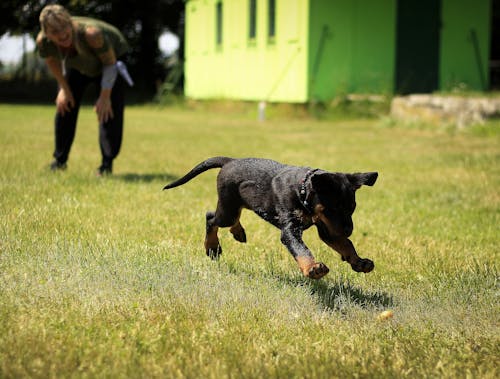Let’s discuss how to stop a dog from digging. Dogs are adorable creatures, no argument there. However, when they start digging and creating holes in your lawn or garden, the cuteness can quickly wear off. Digging is a common behavior in dogs that can be caused by a variety of factors, including boredom, anxiety, and instinct. Luckily, there are several methods you can use to discourage this behavior and redirect their energy towards more constructive activities.
Provide a Designated Space for Digging

One of the simplest and most effective ways to stop your dog from always digging holes in unwanted areas is by providing them with a designated area where they are allowed to indulge in this behavior. This could be a sandbox or a small area of the garden that you’re happy for your dog to dig up. Encouraging them to go to their designated spot and train them to understand that other areas are off-limits.
Get Enough Exercise and Mental Stimulation
Dogs are naturally active animals, and if they aren’t getting enough exercise and mental stimulation, they are more likely to dig. Make sure your dog is getting enough physical activity by taking them out for regular walks and playing with them. Additionally, providing them with toys and puzzles can help keep their minds engaged and tire them out.
Block Access to Undesirable Areas
If there are specific areas of your lawn or garden that your dog likes to dig in, or your dog’s dig pit, you can block off access to them. Use barriers like fences or hedges, bury chicken wire or add decorative features to your garden beds, like rocks or statues, to discourage your dog’s digging habit in these areas.
Train Your Dog Not to Dig
Training your dog not to dig is possible but requires patience, consistency, and positive reinforcement. When you catch your dog digging, immediately say stop digging, interrupt the behavior with a verbal “no” or clap, and redirect them to another activity. When they obey, praise and reward them with treats and attention. Repeat this process until they learn that digging is unwanted behavior.
Consider Behavioral Therapy

If your dog’s digging is excessive and isn’t resolving with other methods, then consulting a veterinarian or professional dog trainer can be helpful. Behavioral modification therapy can assist in identifying the cause of the behavior and implementing an individualized treatment plan to stop the digging once and for all.
The Reasons Behind Your Dog’s Digging Behavior
Have you ever returned home to a yard that’s been completely transformed and riddled with holes? If yes, then you’re probably living with an enthusiastic digger. While the sight of a dug-up yard may seem like a behavioral problem, it’s crucial to understand why dogs dig in the first place. In this blog post, we’ll be exploring the various reasons why dogs dig, as well as some tips to help curb this behavior.
Instinctual Behavior
Believe it or not, digging is an instinctive behavior that’s hardwired into a dog’s DNA. Dogs are descendants of wolves that used digging to create dens for their families and hide food from predators and burrowing animals. So, when your dog is digging, they may simply be trying to create a comfortable space for themselves to rest in or preserve their prey.
Boredom and Lack of Exercise
Another reason why dogs dig holes is because they’re bored or not getting enough exercise. If dogs aren’t getting enough mental and physical stimulation, they may dig up holes in an attempt to entertain themselves and release pent-up energy. In such cases, providing your furry friend with enough exercise, toys, and engaging activities can help them channel their energy in more productive ways.
Attention-Seeking Behavior

Similar to how children seek attention, some dogs may resort to digging as a way of getting their owner’s attention. When a dog realizes that digging causes their owners to come outside and scold or engage with them, they may use it as one of their go-to modes of communication. Instead of negatively reinforcing this behavior, consider rewarding them when they exhibit good behavior.
Environmental Factors
Your dog’s habitat could be another influencing factor behind their digging behavior. During the summer months when the temperatures are high, dogs may dig to create a spot where they can lay or sleep in cool soil. Similarly, dogs that are accustomed to living in woodland areas may dig to catch the scent of prey or even bury their toys.
Anxiety and Stress

Anxiety or stress from hot weather could also be triggers that make your dog dig. Some dogs may dig in anticipation of a storm if they’re scared of the noise and lightning. Dogs can also dig to exhibit what’s known as nervous energy or to vent their general anxiety. In severe cases, it’s essential to address and curb this behavior with the help of a vet or dog behaviorist.
Digging is a common behavior in dogs, and it is a natural instinct for some breeds. However, when anxiety triggers a dog to dig, it can be a harmful behavior both for the dog and their surroundings. Dogs dig for many reasons including boredom, hunting instincts, or to bury things. When an anxious dog starts digging, it is usually a sign of their frustration and anxiety. They may be trying to escape from a scary noise or feeling, or they may be trying to create a safe space for themselves by digging a hole to lie in.
As dog owners, it’s important to understand that digging is a natural and instinctual behavior for our furry companions. By understanding why dogs dig, we’ll be better equipped to provide holistic solutions to manage their behavior. Whether it’s providing plenty of entertainment opportunities, creating a cool and comfortable spot for them to rest in, or even calling in professional help, every dog’s situation is different. With patience, consistency, and plenty of love, we can help our pets build a stronger bond with us and be happier in their environments.
The Health Risks of Dogs Digging
Do you have a furry companion who loves to dig? While it may seem like a harmless activity, digging can actually pose several health risks for your dog. In this blog post, we explore the various health concerns that are associated with dogs digging. Whether you have a backyard or you take your pup to the park, it’s essential to understand the risks of digging so you can keep your furry friend healthy and happy.
Pests and Parasites:
When your dog digs, they can expose themselves to a variety of pests and parasites such as fleas, ticks, and worms. These parasites can affect not only your dog’s health but also your own. Fleas and ticks can cause infestations in your dog house or home, while worms can be transmitted from dogs to humans. By preventing your dog from digging, you can help protect not only their health but also your family’s.
Injuries:
Dogs who dig can easily injure themselves, especially if you have a rocky or uneven backyard. Sharp rocks, broken glass, and metal can all be hidden under the surface, causing cuts, scratches, and even broken bones. In addition, if your dog digs under a front fence line with chicken wire they can get out and wander into traffic, causing more severe injuries.
Allergies and Irritants:
Dogs can come into contact with allergens and irritants when they dig, such as pollen, mold, and toxic chemicals. These allergens can cause your dog to develop allergic reactions, and the chemicals can cause adverse health effects such as vomiting and diarrhea. It’s crucial to keep an eye on your dog while they are digging and ensure that they aren’t exposed to anything harmful.
Behavior Problems:
Digging can become a behavior problem for many dogs if it is not addressed. Some dogs may dig out of boredom, while others may do it due to anxiety or fear. It’s essential to understand why your dog is digging so you can correct the behavior. If your dog is digging out of boredom, you can provide them with more toys or take them on more walks. However, if the digging is a sign of anxiety, it’s important to consult with a veterinarian or a dog trainer to find a solution.
Destruction:
Finally, digging can cause destruction to your property and even your neighbor’s property. If your dog digs up the garden or the yard, it can be frustrating and expensive to repair the damage. Additionally, if your neighbor’s property is affected by digging zone, it can strain relationships and lead to legal issues. By preventing your dog from digging, you can avoid these problems and maintain good relationships with your neighbors.
All in all, dogs digging may seem like a cute and harmless activity, but it can pose several health risks to your furry friend. From pests and parasites to injuries and irritants, digging can harm your dog’s health in various ways. To prevent these health issues, it’s essential to understand why your dog is digging and take steps to address the behavior. By keeping your dog healthy, you can ensure that they lead a long and happy life.
Ultimately, stopping your dog from digging requires patience, consistency, and a willingness to experiment with different methods until you find what works best for you and your pet. Remember, dogs are intelligent creatures, and with the right tools and training, they can be taught to behave appropriately. By providing designated spaces for digging, increasing their exercise and stimulation, blocking off undesirable areas, training, and seeking professional help if necessary. Your adorable dog can dig in the right spot and leave the rest of your lawn intact!
Is your dog still digging after using these tips we read above? Here at Ruff House Dog Training we understand how much you love your pet, but hole digging can be frustrating. We provide 90-minute classes to help you and your fur baby. Give us a call today!











